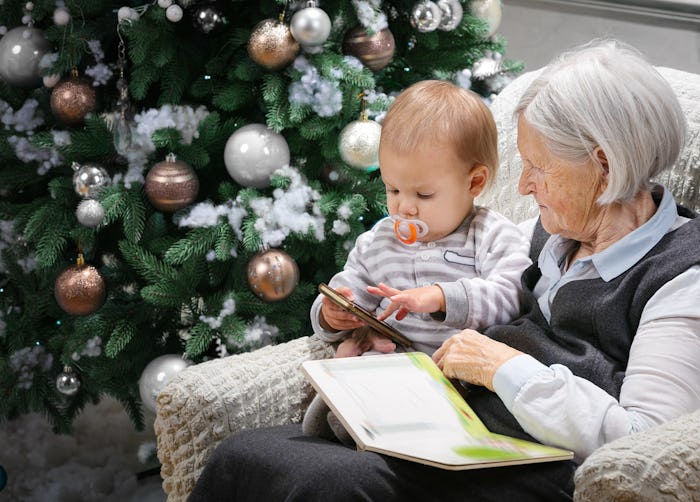Life

If Your Baby Won't Stop Crying In Their Grandparents' Arms, There Are 5 Tricks To Try
The holiday season is upon us, and it's about that time when your little babe is going to meet, and spend time with, a lot of new or unfamiliar people — namely, extended friends and family. This is always a sensitive situation for parents, as you don't want to push baby to do something they don't want, but also don't want to unintentionally offend well-meaning huggers and kissers. The situation becomes even more complicated when involving grandparents who like to do nothing but hold their grandchild. Here's some tricks to get a baby to stop crying in their grandparents' arms, so you can try to keep family time as smooth as possible.
There's no simple, one-size-fits-all solution to getting your kid to stop crying in their grandparents' arms. Because babies are just little people, there could be a number of reasons why they're crying in someone else's arms. They could just be uncomfortable (hungry, cranky, poopy, or mispositioned), unfamiliar, just prefer mom or dad (crying is a form of protest as much as it is communication), or not getting great vibes (we all have those relatives, as well). Also, babies are babies, and sometimes they just cry. While we should never try to force our kiddos into doing something they're not too comfortable with, there are some ways you can help them become more familiar with their grandparents or other extended relatives.
1Set Up A Schedule
"Planning ahead is very important," Leigh Anne O'Connor, International Board Certified Lactation Consultant, tells Romper. "So is communication." Be clear with your relatives about your intentions and how long you will stay somewhere (or how long guests should stay with you). "Parents can host events with a timeline, for example, Christmas brunch from 11:00 a.m. to 2:00 p.m.," suggests O'Connor. "Or," she continues, "new parents can agree to visit a relative, and they can plan ahead regarding how long they are going to stay." Having a set timeline will allow you to plan around baby's feedings and naps, and allow you an escape if things are not going well.
2Create A Familiar Environment
It can help to be at your own home if your baby is meeting or spending time with relatives; the comfort of their own familiar environment can make a big difference. But, if you are traveling somewhere, "Bring familiar toys, foods, and books for the baby," notes O'Connor. Having them interact with familiar items while in their grandparents' arms can ease their initial discomfort. Older babies can find security in their loveys or favorite books, and younger babies may be more open to having a grandparent feed them a bottle.
It also helps for you to stay close as your baby is adjusting to being in someone else's arms. Sitting next to your relative as they interact with your little one can help to create a familiar and secure environment.
3Be On The Same Page With Your Spouse
As Parents noted, it's vital for you and your partner to be on the same page when it comes to dealing with your parents and other relatives. Decide on the boundaries and limits you will pertain to with your children (for example, a guideline in ours is that you don't pull a child from another person's arms, but let them come to you willingly), and present a united front with other family members. Things can get tense quickly, for everyone involved, if you and your partner bend the rules with certain family members and not others. Be clear about your expectations, and this way, you both can feel comfortable in speaking with others as a team.
4Find Their Strengths
Grandparents, like all people, have different strengths and comfort zones. Some may be wary of very young babies, while others don't particularly love acting silly with toddlers. Finding their strength and playing it up can help them feel involved and considered. For instance, if a grandparent adores holding young babies in-between feedings, be sure to give them a chance to do so. Another may feel more comfortable taking older babies outside to play, or playing with them on the floor. Even little babies can sense when someone is uncomfortable or anxious, and that can result in even more tears. Talk to your relatives about what they feel good about doing, and help them do that.
5Realize This Phase Is Likely Temporary
Just like everything else having to do with children, this is likely just a temporary phase. Babies go through so much developmentally in a short period of time — clinging to their parents is a normal and natural way for them to begin to learn about the world around them in a safe way. Babies are young, and building relationships takes time. If grandparents are calm, not pushy, and patient, it's only a matter of time before baby begins to feel secure around them, as well.
Be patient with your relatives, and encourage them not to compare the current status of their relationships with their grandchildren with those of their other friends or relatives. All babies, and grandparents, are different — sometimes it takes a bit for them to get used to each other. And, that's really OK.
Check out Romper's new video series, Romper's Doula Diaries:
Watch full episodes of Romper's Doula Diaries on Facebook Watch.